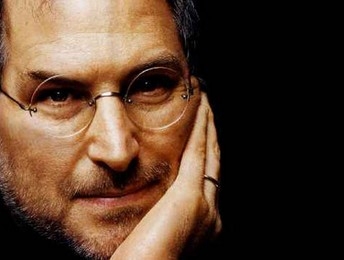The Romantic
羅曼史
When it came to women, Jobs could be deeply romantic. He tended to fall in love dramatically, share with friends every up and down of a relationship, and pine in public whenever he was away from his current girlfriend. In the summer of 1983 he went to a small dinner party in Silicon Valley with Joan Baez and sat next to an undergraduate at the University of Pennsylvania named Jennifer Egan, who was not quite sure who he was. By then he and Baez had realized that they weren’t destined to be forever young together, and Jobs found himself fascinated by Egan, who was working on a San Francisco weekly during her summer vacation. He tracked her down, gave her a call, and took her to Café Jacqueline, a little bistro near Telegraph Hill that specialized in vegetarian soufflés.
關于女人,喬布斯可以是非常浪漫的。他會戲劇性地墜入愛河,跟朋友們分享戀愛中的每一次起伏,也在分手后公開展現(xiàn)他的失落。1983年夏天,他跟瓊·貝茲去硅谷參加一個小型的晚餐聚會,身邊坐了一個賓夕法尼亞大學的本科生,名字叫珍妮弗·伊根(JenniferEgan),而那個女孩還不太清楚他是誰。當時喬布斯和貝茲已經(jīng)意識到他們不會永遠在一起永遠年輕了,而喬布斯發(fā)現(xiàn)自己被伊根迷住了。伊根當時在舊金山一家周刊作暑期實習。他找到她,給她打電話,帶她去杰奎琳咖啡廳(CaféJacqueline),那是電報山附近一家以素食舒芙蕾為特色的小餐館。
They dated for a year, and Jobs often flew east to visit her. At a Boston Macworld event, he told a large gathering how much in love he was and thus needed to rush out to catch a plane for Philadelphia to see his girlfriend. The audience was enchanted. When he was visiting New York, she would take the train up to stay with him at the Carlyle or at Jay Chiat’s Upper East Side apartment, and they would eat at Café Luxembourg, visit (repeatedly) the apartment in the San Remo he was planning to remodel, and go to movies or (once at least) the opera.
他們約會了一年,喬布斯常常飛來東部看她。一次在波士頓的Macworld大會上,他告訴一大群觀眾自己是如何深陷愛河,必須搭航班趕去費城看望他的女朋友。觀眾也為之動容。他到紐約時,她也會坐火車趕去紐約,跟他住在卡萊爾酒店(Carlyle)或杰伊·恰特的上東區(qū)公寓,他們會在盧森堡咖啡廳(CaféLuxembourg)吃飯,并曾幾次去看他在圣雷莫那套打算重新裝修的公寓,還會去看電影甚至是歌劇。
He and Egan also spoke for hours on the phone many nights. One topic they wrestled with was his belief, which came from his Buddhist studies, that it was important to avoid attachment to material objects. Our consumer desires are unhealthy, he told her, and to attain enlightenment you need to develop a life of nonattachment and non-materialism. He even sent her a tape of Kobun Chino, his Zen teacher, lecturing about the problems caused by craving and obtaining things. Egan pushed back. Wasn’t he defying that philosophy, she asked, by making computers and other products that people coveted? “He was irritated by the dichotomy, and we had exuberant debates about it,” Egan recalled.
很多個夜晚,他和伊根會煲?guī)讉€小時的電話粥。他們爭執(zhí)不休的話題之一是他源于佛教修行的一個信條:要避免對物質(zhì)的執(zhí)著。他告訴伊根,我們的消費欲望是不健康的,要過一種不執(zhí)著、非物質(zhì)的生活以達到覺醒。他甚至寄給她一盤他的師父乙川弘文的錄像帶,是講由于對物質(zhì)的執(zhí)著追求引發(fā)的問題。伊根反駁說,他在制造電腦和其他讓人們著迷的產(chǎn)品,這難道不是跟他推崇的哲學背道而馳嗎?“他為這種矛盾而困擾,我們因此常常激烈地辯論。”伊根回憶說。
In the end Jobs’s pride in the objects he made overcame his sensibility that people should eschew being attached to such possessions. When the Macintosh came out in January 1984, Egan was staying at her mother’s apartment in San Francisco during her winter break from Penn. Her mother’s dinner guests were astonished one night when Steve Jobs—suddenly very famous—appeared at the door carrying a freshly boxed Macintosh and proceeded to Egan’s bedroom to set it up.
最后,喬布斯對自己產(chǎn)品的驕傲戰(zhàn)勝了人們不該迷戀這種東西的想法。1984年1月,麥金塔問世時,伊根正住在她母親在舊金山的公寓過寒假。一夜成名的史蒂夫·喬布斯有一天突然出現(xiàn)在門口,震驚了伊根母親的晚餐客人。他搬了一臺尚未拆箱的麥金塔,徑直走到伊根的臥室去安裝。
Jobs told Egan, as he had a few other friends, about his premonition that he would not live a long life. That was why he was driven and impatient, he confided. “He felt a sense of urgency about all he wanted to get done,” Egan later said. Their relationship tapered off by the fall of 1984, when Egan made it clear that she was still far too young to think of getting married.
如他告訴少數(shù)幾個朋友的那樣,喬布斯也告訴伊根,他預計自己不會很長壽。他說正因如此,他才會那么馬不停蹄,那么缺乏耐心。“對他想要做成的事情,他覺得迫切需要盡快去做。”伊根后來說。到1984年秋季,他們的關系逐漸轉淡,伊根明確表示她現(xiàn)在太年輕了,談婚論嫁還為時過早。
Shortly after that, just as the turmoil with Sculley was beginning to build at Apple in early 1985, Jobs was heading to a meeting when he stopped at the office of a guy who was working with the Apple Foundation, which helped get computers to nonprofit organizations. Sitting in his office was a lithe, very blond woman who combined a hippie aura of natural purity with the solid sensibilities of a computer consultant. Her name was Tina Redse. “She was the most beautiful woman I’d ever seen,” Jobs recalled.
此后不久,即喬布斯跟斯卡利在蘋果的矛盾于1985年初開始形成的時候,有一天他趕去開會,順便去找一個跟蘋果基金會合作、幫助非營利組織募捐電腦的人。那人的辦公室里坐著一個柔美的金發(fā)女子,結合了自然純凈的嬉皮士氣質(zhì)和計算機咨詢師的扎實敏銳。她的名字叫蒂娜·萊德斯,為人民電腦公司工作。“她是我見過的最美的女人。”喬布斯回憶說。
He called her the next day and asked her to dinner. She said no, that she was living with a boyfriend. A few days later he took her on a walk to a nearby park and again asked her out, and this time she told her boyfriend that she wanted to go. She was very honest and open. After dinner she started to cry because she knew her life was about to be disrupted. And it was. Within a few months she had moved into the unfurnished mansion in Woodside. “She was the first person I was truly in love with,” Jobs later said. “We had a very deep connection. I don’t know that anyone will ever understand me better than she did.”
幾天后,他同她在附近的公園散步,再次約她出去,這次她告訴她男朋友,她想去了。她非常誠實坦率。晚飯后,她哭了起來,因為她知道她的人生就此會被打亂了。事實的確如此。沒過幾個月,她就搬進了喬布斯在伍德賽德那座沒裝修的大房子。“她是我真正愛的第一個人,”喬布斯后來說,“我們是那么心意相通。我不知道誰還能比她更理解我。”











